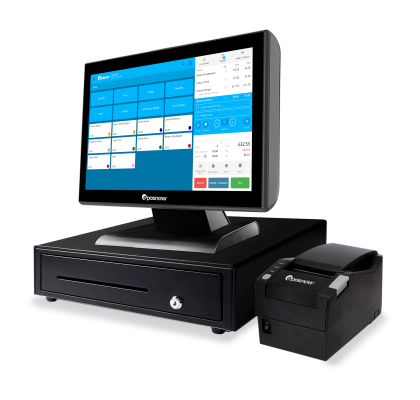How Much Do Credit Cards Charge Retailers?
Who doesn’t love the simplicity of a credit card transaction? Especially with the advent of contactless payments, transactions have become as simple as tapping a rectangular piece of plastic onto a card machine.
This ease of use has led to a drastic change in consumer habits as more and more people are switching away from outdated cash payments. As a business owner, you have likely realized that not accepting credit cards is ill-advised; to be successful, it's practically essential.
What the regular consumer may not know is that all credit and debit card transactions come with a charge to the business they’re buying from. The exact amount this charge will cost varies depending on a number of different factors, which we’ll explore in this blog*.
What is a credit card transaction?
A credit card transaction is exactly what it sounds like. It’s when a customer purchases a good or service using their credit or debit card. Thanks to advanced electronic point of sale (EPOS or POS) systems, such as the Epos Now Complete Solution, this process is entirely automated.
Credit and debit card transactions are conducted using a universal system called “Payment Processing”. While transferring money from one account to another through the air may seem like magic to those who remember the ha’penny, it is a process based on cold hard science.
Payment processing can be broken down into three steps:
- Authorisation - The customer inserts their chip card into the card machine and enters their pin. Their bank is alerted to the transaction and verifies the card is legitimate. This is done by checking the details on the card against the data the bank has.
- Authentication - Once the card details are verified, the bank then checks the transaction is authentic. The bank will then authorise the release of credit to the business's merchant account.
- Settlement - At this point, the transaction concludes, the receipt printer will print a receipt, and the money is transferred into the merchant account. Depending on the system and banks involved, this can be instantaneous or take a day or two.
As we’ve mentioned above, each one of these transactions comes with a charge to the business conducting the sale. We should now have a good understanding of what a credit card payment is and the process behind it. It’s now time to get to the bottom of the charges to the business.
Gain all the advantages of an EPOS system with detailed, flexible, downloadable reports, and so much more:
- Manage and update products quickly with easy to use software
- Expand your business into multiple channels and integrate with a variety of online platforms
- Manage multiple locations and salespoints with multi-site management
- Keep queues short with streamlined, modifiable sales processes
- Choose a setup that suits you with software and hardware options

How much do credit card companies charge retailers UK?
In both the retail and hospitality industries, large and small businesses alike will have to pay transaction fees. Unfortunately, there is no way around these fees and they should be considered when you’re drafting your budget in your business plan.
There are a number of different fees with card transactions and it can quickly become confusing if you don’t get a good understanding of what they are. These credit card machine processing fees include:
- General transaction fees - This is the basic fee and is usually capped somewhere between 1-3% per sale.
- Authorisation fees - This fee is charged by the bank to process the payment. The fee can change depending on the bank but is usually a 1-2p.
- Merchant service charge - This fee is for transactions conducted with a debit card. This is a very negligible charge that usually comes in around 0.25-0.35% per sale.
While these charges may seem insignificant, over time they can build up and become a considerable expense. Larger businesses will generally be able to absorb the cost and some smaller enterprises minimise the fees by imposing a minimum spend limit on card transactions.
We would present a note of caution for small businesses that impose minimum card payment limits. Many customers consider this to be a major annoyance and may decide to take their custom elsewhere. Before you impose a minimum spend, consider whether the hit to your customer experience is worth it or not.
Furthermore, to provide you further insights before making any decision that might affect your business experience, you can also consider which credit card processing is the cheapest for your business or if you would like to accept credit card payments without a merchant account to avoid paying processing fees that might not be essential.
Payments made easy
At Epos Now, we know that business owners are under a lot of stress. Much of this stress comes from dealing with the minutia that comes with running a small business such as credit card fees.
Epos Now Payments is designed to be as simple as possible so that our customers don’t need to worry about it and can get on with running their businesses. To this end, Epos Now Payments seamlessly integrates with your POS system so you can control everything from one device.
In terms of fees, we make sure to keep ours at a consistent level so you can be sure of how much you’ll end up paying. As a rule, Epos Now Payments will only ever charge you flat rates, saving you time and worry.**
If you’d like to know more about how Epos Now could help your business, get in touch with our expert team below.
*All information in this blog pertains to the UK. While most fees are kept consistent across the world, they can change depending on your location. We recommend you do your own research if you’re unsure of the process in your country.




